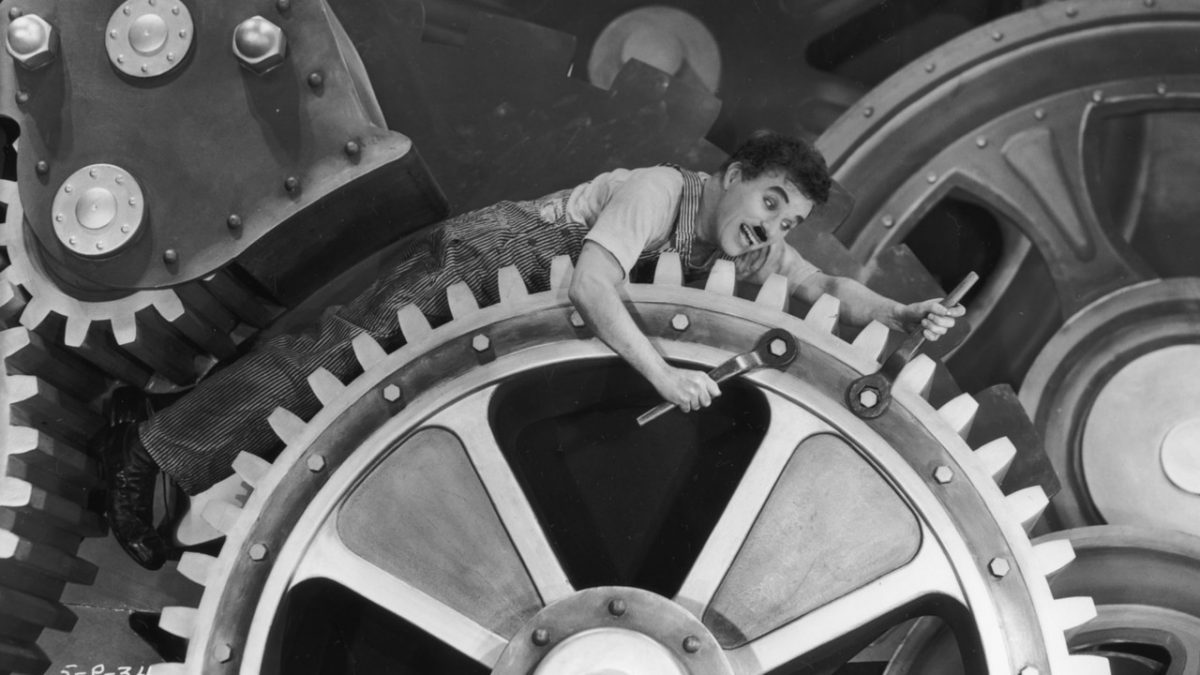Modern Times

Charlie Chaplin
USA – 1936

Screenplay: Charles Chaplin
Cinematography: Ira H. Morgan, Roland Totheroh
Production: Charles Chaplin Productions
Language: English
Duration: 87 min
Color: Black and White
Synopsis: Charlie the Tramp finds it difficult to keep up with modernity and the assembly line, which reduces men and women into mere accessories to the machine. When he is ‘volunteered’ for an experiment with a feeding machine to test if production can continue without the nuisance of meal breaks, Charlie suffers a nervous breakdown and is sent to a sanatorium to recover. Cured and on the street, he is quickly re-institutionalized—this time in jail—for unwittingly leading a worker’s protest. In the back of the police paddy wagon he meets a kindred soul, a girl who has escaped the horrors of the orphanage, arrested for stealing a loaf of bread. When he foils a jailbreak, he is released back into society as a fine example of a recovering socialist. Once again homeless on the street, Charlie and the girl try to live with dignity in a cold modern world that, in reality, is greedy and primitive.
Notes:
To the powerful goes the voice. Indeed, the only speaking voices heard in Modern Times come from individuals tied to systems of power and capital (the company president, the industrial salesman, the radio advertiser), and when they speak they do only one of two things—give orders or try to sell something. That is, they try to shape the world and the people around them to their agenda and their goals. More than that, though, they only ever speak when they are mediated in such a way that there can be no possibility of a response: the company president speaks into a video intercom system; the feeding machine salesmen communicate via a pre-recorded sales pitch; a radio advertisement comes on in the warden’s office.
Modern Times shows Chaplin’s first signs of a forced aesthetic transformation, the world of speech penetrating and reordering the universe of “gentle skepticism” that he had so carefully been crafting almost from the moment he first stepped behind the camera. In this way, the film is of a piece in its aesthetics and philosophy with Chaplin’s final capitulation in The Great Dictator: his first full-fledged talkie and his fullest statement on the dangers of a monovocal world. Speech, as Chaplin sees it, stands in opposition to multiplicity and simultaneity, to the multifaceted and multivalent. If the sight of unbroken space can hold within it many individual realities presented at once, speech demands that those realities be presented, at best, one at a time, succession replacing simultaneity as the fundamental ordering principle. More typically, though, it demands not even succession but singularism: one story, one voice. In Siegfried Kracauer’s description, the person speaking must almost always in some way “take the lead,” as dialogue will “automatically turn the spotlight on the actor, featuring him as an insoluble entity.” If speech is disruptive and oppressive in Modern Times, it becomes downright dangerous in The Great Dictator. Speech itself can control; speech itself can harm. And the Tramp, for all his resourcefulness and charm, is ultimately ill equipped to contend with it. If the Tramp had always been not actually voiceless but a living embodiment of voicelessness—even unvoiceability—in Modern Times and The Great Dictator he would be placed against the very figures of the modern world (industrial titans, capitalist advertisers, political dictators) whose voices were loudest of all. The voiceless Tramp would finally confront the voices of the powerful. And Chaplin himself finally would have to confront speech and the changes sound would bring to his working methodology.
Notes drawn from Kornhaber, Donna. 2014. Charlie Chaplin, Director. Evanston, Illinois: Northwestern University Press.


